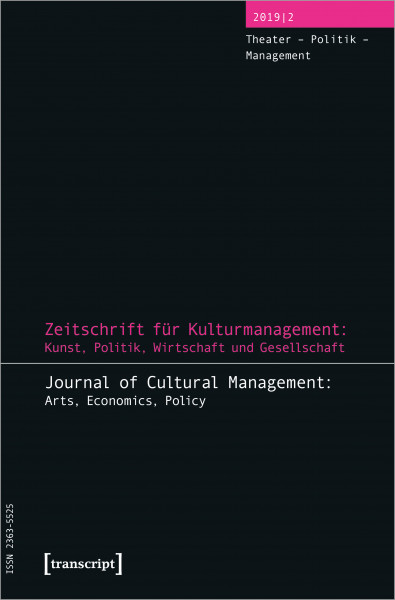Essay
Questions of Power: Discipline and the Greedy Theatre
Abstract
Theatre is a world in itself and claims to make the whole world its subject. In the eighteenth century it emerged as a modern corporation to improve society and to serve as a “moral institution”. Backed by enhanced technology and organization the theatre thus became part of a series of modern organizations committed to the ideals of humanity and rationality, but based on rigid disciplinary power as described by Foucault. Based on the situation in German-speaking countries, this article describes the conflicting ambivalence between negotiated contents and working practice within the framework of largely unchanged power structures. Using Lewis A. Coser’s concept of the ‘greedy institution’, the theatre proves to be a possessive institution that succeeds in capturing the attention of its members to the highest degree and exploiting them for their higher goals.
Keywords
2019 (2)
Theatre – Politics – Management

Related Articles
Journal of Cultural Management and Cultural Policy
Research Article
Wertesysteme von Kulturmanagern
Eine explorative TypologieYearbook for Culture Management 2010
Research Article
Imposed leadership in UK funded theatre and the implications for risk and innovation
Journal of Cultural Management 2019 (1)
Research Article
Journal of Cultural Management 2019 (2)
Research Article
Retooling for the Revolution: Framing the Future of Museum Management After COVID-19
Journal of Cultural Management and Cultural Policy
Essay
Kulturelle Partizipation im Langzeitvergleich
Eine empirische Analyse am Beispiel der Stadt KölnYearbook for Culture Management 2012
Research Article
© 2026, Journal of Cultural Management and Cultural Policy
Keywords
- Aesthetics
- Higher Education
- Cultural Diplomacy and Foreign Cultural Policy
- Occupation
- Career and Professional Role
- Audience Development
- Audience Studies and Visitor Studies
- Visitor Motivations
- Business
- Covid Pandemic
- Democracy
- Digitalization
- Diversity
- Third Sector
- Empirical Aesthetics
- Development
- Ethics
- Evaluation
- Field Theory
- Festival
- Film
- Federalism
- Community Arts
- Societal Change
- Ideology
- Staging
- Career
- Communication
- Concert
- Creative Industries
- Creativity
- Crisis
- Culture
- arts organizations, cultural organizations
- Cultural Participation
- Cultural Change
- Fincancing The Arts
- Cultural Promotion Law
- Cultural History
- Cultural Management
- Cultural Economy
- Cultural Organizations
- Art Education
- Cultural Policy
- Cultural Production
- Cultural Sociology
- Art Education
- Cultural Understanding
- Arts Administration
- Cultural Industry
- Cultural Sciences
- Art
- Art Field
- Arts Research
- Artists
- Artistic Research
- Artistic Reputation
- Arts Management
- Arts Organizations
- Art education
- Arts Marketing
- Arts Administration
- Curating
- Leadership
- Literature
- Advocacy
- Management
- Marketing
- Market
- Media
- Methods Development
- Mexico
- Monumentalizing
- Museum
- Music
- Non-Visitor Studies
- Opera
- Orchestra
- Organization
- Political Expression
- Post-truth Politics
- Professional Role
- Audience
- Audience Development
- Law
- Government
- Role
- Socially Engaged Art
- Social Cohesion
- Social Change
- Social Cohesion
- Non-visitor Socio-demographics
- Socioculture
- State
- Symbolic capital
- Dance
- Participatory Justice
- Theatre
- Theatre Governance
- Theory Development
- Tourism
- Transformation
- Survey
- Entrepreneurship
- Urbanism
- Civil Society


